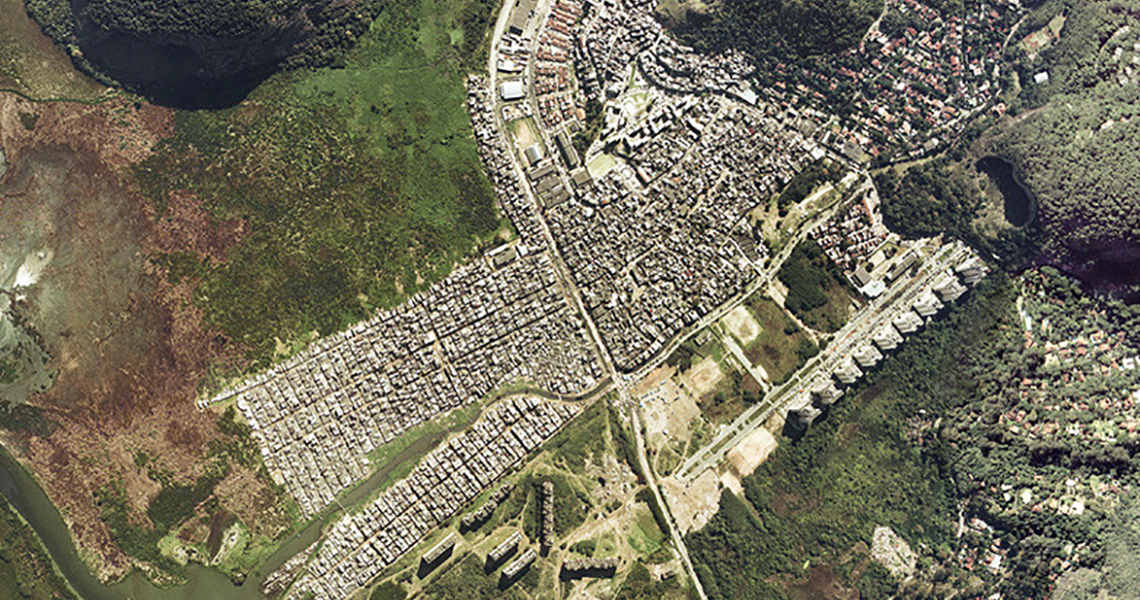Rio Das Pedras Community Health Diagnosis
Testing innovative data collection methods to assess community health and mobility at an informal community

Source: Instituto Brasileiro de Geografia e Estatística (Brazilian Institute of Geography and Statistics)
Summary
The majority of the world’s population now lives in urban areas. Much of the migration to cities is among the poor and informal community settlements, within or on the periphery of larger cities. The lack of resources or coordination contributes to unhealthy environments and to marginalization from the formal sector. As a result, many informal communities suffer from worse health outcomes than do individuals living in other parts of the city, undermining quality of life and life expectancy. The physical and environmental deficiencies in informal communities matter for the health of the entire city, but are not well understood and in only a few instances have physical environment improvements in such settings been rigorously evaluated.
Data to characterize the street-level conditions and the health of residents in these communities is limited. Rio das Pedras is one of over 600 informal communities or "favelas" located in Rio de Janeiro, Brazil. Like other informal urban settlements, this community faces significant public health challenges.
In this project, we aimed to map resources and hazards driving population health patterns across Rio das Pedras. We surveyed residents and conducted in depth interviews on their household health needs, risk factors, salient barriers to health, and perceptions of public health-protective infrastructure changes. Concurrently, we assessed the feasibility of using supplementary data collection approaches on individual mobility, street-level auditing, and the microbiome. As a result of our research, we delivered to local stakeholders a community health diagnosis and recommendations on targeted interventions and potential population-based strategies to address observed barriers to health and maximize the benefits from existing systems.
Partners
Escola Nacional de Saúde Pública Sergio Arouca; Columbia University Built Environment and Health Research Group; Columbia Global Centers | Rio de Janeiro; Columbia Graduate School of Architecture, Planning, and Preservation Studio X Rio de Janeiro; Nucleo de Cidadania e Pesquisa; Clinica da Famila Otto Alves de Carvalho; New York City Department of Health; International Longevity Center; Fulcrum App Development Team; Science without Borders; and Global Research Analytics for Population Health.
Research Methods
This feasibility study trained residents recruited from systematically selected households. The team adapted novel methods for data collection that included adult surveys, drinking water and saliva sample collection, location logging using GPS, and in-depth interviews. Survey questions emphasized information on socio-demographic characteristics, health and lifestyle behaviors, health care access, and the physical features of the residence. In addition, the research team used Fulcrum, a smartphone-based data collection platform, to audit street segments.
Upon completion of data collection, we collected and analyzed:
- 108 households enumerated, with a randomly selected adult at 103 completed individual long questionnaires;
- 14 in-depth qualitative interviews, including questions about health care access and the local environment;
- 185 drinking water samples across 93 households, measuring up to six physical-chemical and bacteriological parameters;
- 320 person-days of observed GPS data from 82 participants (log activity recorded every 3 seconds);
- 643 street audits, and gathered 4,499 geotagged photos.
Based on collected data and previous literature, we provided evidence-based recommendations to address health needs in Rio das Pedras related to sanitation and water; street safety and recreational spaces; health care and emergency response; housing and economic opportunity; and food systems. Further description of street audit data collection can also be found at Fulcrum's blog post "Community Needs Assessment for Rio das Pedras, Brazil."
Research Results
The following papers have been published:
Mooney, S.J., Sheehan, D.M., Zulaika, G., Rundle, A.G., McGill, K., Behrooz, M.R., Lovasi, G.S. Quantifying distance overestimation from global positioning system in urban spaces. American Journal of Public Health, 2016. 106(4): p. 651-653.
Castiglione, D., Carvalho, M., Lovasi, G. Perceptions and uses of public and private healthcare in a Brazilian favela. Qualitative Health Research, 2018: 28(1): p. 159-172.
Remigio, R., Rabello, R.S., Zulaika, G., Carvalho, M.S., Barrocas, P.R.G., Lovasi, G.S. Household-level drinking water quality, access, and management practices within an informal community: a case study at Rio das Pedras, Rio de Janeiro. Journal of Water, Sanitation and Hygiene for Development, 2019. 1;9(1): p. 80-9.
Remigio, R.V., Zulaika, G., Rabello, R.S., Bryan, J., Sheehan, D.M., Galea, S., Carvalho, M.S., Rundle, A., Lovasi, G.S. A Local View of Informal Urban Environments: a Mobile Phone-Based Neighborhood Audit of Street-Level Factors in a Brazilian Informal Community. Journal of Urban Health, 2019. 18: p. 1-2.
Ndjila, S., Lovasi, G.S., Fry, D., Friche, A.A. Measuring neighborhood order and disorder: a rapid literature review. Current Environmental Health Reports, 2019. 6(4): p. 316-326.
Fry, D., Mooney, S.J., Rodríguez, D.A., Caiaffa, W.T., Lovasi, G.S. Assessing Google Street View image availability in Latin American cities. Journal of Urban Health, 2020. 97:552–560
Future research using technology (e.g. Google Street View) to characterize the neighborhood environment continues with the Systematic Transportation and Recreation Environment Evaluations using Technology (STREET) project. STREET builds on prior efforts from the Rio das Pedras project and several others including Salud Urbana en América Latina (SALURBAL).
Acknowledgements
Thank you to the team in Rio de Janeiro, who were crucial to making the larger project successful including those in the local and state agencies who helped us understand health systems and access data.
And a very special debt of gratitude to the participants for their cooperation and their willingness to be a part of this work. For full acknowledgements see the stakeholder report, “A Community Health Diagnosis of Rio das Pedras.”
Research Team
Funding provided by Medtronic Philanthropy (FY-000483); Dana and David Dornsife.